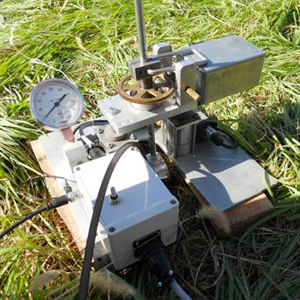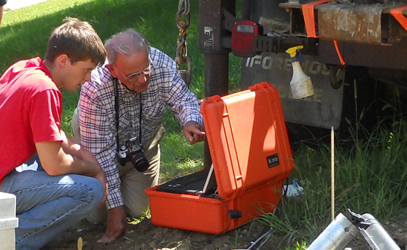
An Iowa State University geotechnical engineering research duo has automated a soil strength test invented by an Iowa State civil engineering professor emeritus.
Jeramy Ashlock, assistant professor and Black & Veatch Building a World of Difference Faculty Fellow, and geotechnical engineering Master’s graduate Ted Bechtum have automated the Borehole Shear Test (BST), an on-site soil strength test used for landslide analysis, stream-bank stability, and in early stages of building and highway construction. The BST has been used to study a diverse range of problems ranging from the impact of river bank caving on the Great Barrier Reef in Australia to major dams and other earth construction in China.
Conventional direct shear testing requires bringing soil samples back from the field to test in the laboratory. The BST process is much quicker, allowing data to be collected on site. While one traditional test can take several days, the BST process can give results in one hour. By automating the BST, the efficiency and simplicity of the test is increased even further. Geotechnical engineers are able to repeat more tests in a given time than ever before. The automated BST also provides time-histories of shear stress and shear displacement. This creates possibilities for future applications, such as improving assessment of liquefaction susceptibility of soils during earthquakes.
To automate the BST, Ashlock and Bechtum added a stepper motor, a stepper controller, electronic pressure sensors, an electro-pneumatic pressure regulator, and created a software control program.
Bechtum, under the guidance of Ashlock, started the project to automate the BST in summer 2010. That spring he had just taken CE 360 (Geotechnical Engineering), where he discovered his love for geotechnical engineering. “Soil properties are open for interpretation, which I find intriguing,” Bechtum said. “I also found the BST project very practical and ready for future use in the field.”
Bechtum defended his thesis on the Automated BST (ABST) in November. He earned his BS in civil engineering from Iowa State in December 2011 and will earn his MS in civil engineering this December as part of the concurrent BS/MS program offered at Iowa State.
Anson Marston Distinguished Professor Emeritus Richard Handy (PhDCE’56) and his company, Handy Geotechnical Instruments, worked with Ashlock and Bechtum to automate the test he invented in the 1960’s. Handy taught geotechnical engineering at Iowa State from 1956-91.
Ashlock and Bechtum licensed the ABST control program through the Iowa State University Research Foundation. Sales of the automated program they developed grant royalties to the research duo.
In January 2013 Bechtum becomes a geotechnical engineer for Burns & McDonnell in Kansas City.
